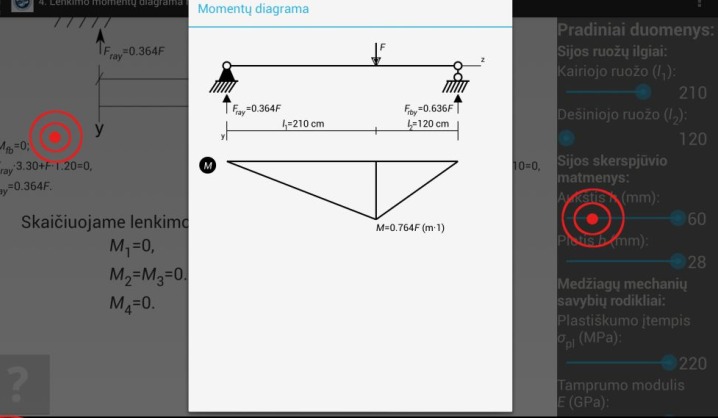- Programmes in English 2025/2026
- Admission 2024/2025 Scholarships
- For exchange students
- Free Movers
- Transfer studies
- Erasmus+ studies and traineeships
- Mentor programme
- Student testimonials
- Accommodation
- Career Services
- Medical Care
- Immigration Regulations
- Leisure and Student Activities
- Useful information
- VILNIUS TECH for Creators of Tomorrow
- Mental and spiritual support
- Representatives Abroad
- Contacts
- Computer Engineering

2014-08-22
Virtual experiments - in VGTU student’s application
In order to facilitate learning for students of construction engineering, Vilnius Gediminas Technical University (VGTU) student of techno-mathematics Tadas Vysockis has developed instructional design application that will help to broaden the scope of knowledge in the field of materials’ mechanics.
After installing this app into a smart device, a student may opt out several books and run virtual experiments: the data, changing dimensions of ideally tensile plastic element construction or external terms in the application, is also reflected in the virtual testing space. According to the creator, another educational analogue-like running application, displaying the real data and applied for Android operating system, does not exist.
"With the development of new technologies, the learning methods are also developing. This app is an attempt to combine engineering, mathematics and computer programming’ knowledge and facilitate learning for the peers: theoretical knowledge and explanations, presented attractively and on the contemporary basis, make it easier to grasp the study subject; and the installed calculation system represents the results of complex calculations in the virtual space,"– explained T. Vysockis, the developer of the application. The dimensions of the structure’s parts, the size of the force, acting on it, the elasticity module, the diameter and other readings can be changed in the virtual experimental space.
"The mechanics of materials of building engineering is the subject, learning which, experiments are obligatory. While creating innovative and applied for modern technological environments learning tools, part of the experiments are transferred into the virtual space. This allows to see the results of costly or large-scale experiments, because virtual space does not influence students and researchers’ experimental results neither by size, nor materials, or other indicators", - told Kęstutis Vislavičius, Associate Professor of the Department of Materials Resistance and Theoretical Mechanics, who is a teacher of T. Vysockis.
Currently, the application is being improved, preparing for introducing it to “Google Play" app store. It is expected the application to become popular among engineering students.
After installing this app into a smart device, a student may opt out several books and run virtual experiments: the data, changing dimensions of ideally tensile plastic element construction or external terms in the application, is also reflected in the virtual testing space. According to the creator, another educational analogue-like running application, displaying the real data and applied for Android operating system, does not exist.
"With the development of new technologies, the learning methods are also developing. This app is an attempt to combine engineering, mathematics and computer programming’ knowledge and facilitate learning for the peers: theoretical knowledge and explanations, presented attractively and on the contemporary basis, make it easier to grasp the study subject; and the installed calculation system represents the results of complex calculations in the virtual space,"– explained T. Vysockis, the developer of the application. The dimensions of the structure’s parts, the size of the force, acting on it, the elasticity module, the diameter and other readings can be changed in the virtual experimental space.
"The mechanics of materials of building engineering is the subject, learning which, experiments are obligatory. While creating innovative and applied for modern technological environments learning tools, part of the experiments are transferred into the virtual space. This allows to see the results of costly or large-scale experiments, because virtual space does not influence students and researchers’ experimental results neither by size, nor materials, or other indicators", - told Kęstutis Vislavičius, Associate Professor of the Department of Materials Resistance and Theoretical Mechanics, who is a teacher of T. Vysockis.
Currently, the application is being improved, preparing for introducing it to “Google Play" app store. It is expected the application to become popular among engineering students.











